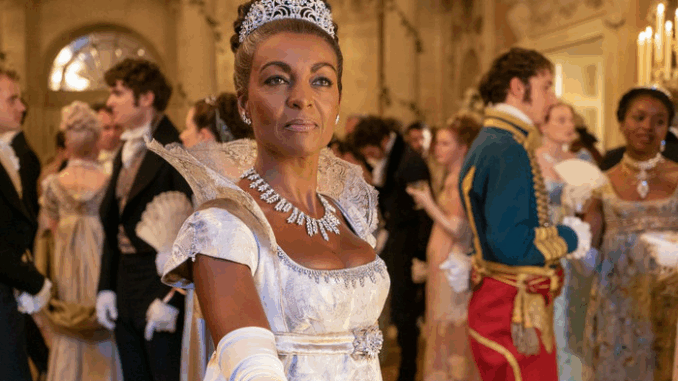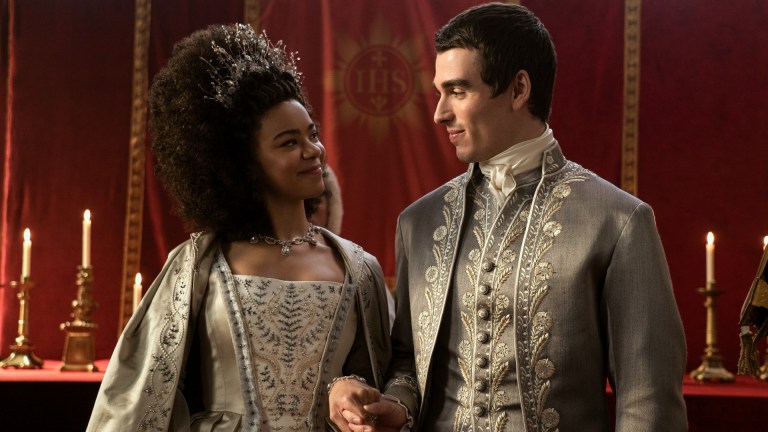
Is Lady Danbury the Real Power Behind the Throne? This Bridgerton Theory Will Make You Rethink Everything
In the lush world of Bridgerton, where loyalty is currency and every glance holds weight, one character has consistently stood above the rest—not just in elegance, but in quiet control: Lady Danbury. Long believed to be Queen Charlotte’s most trusted confidante, she’s been the iron spine of every ballroom and whisper campaign. But what if that trust is the grandest illusion of all?
A compelling fan theory gaining momentum suggests Lady Danbury isn’t merely an ally—she may be the most strategic and calculated figure at court, quietly rewriting the rules while the Queen believes she’s holding the pen. If this theory is true, Bridgerton has hidden its most powerful player in plain sight all along.
Lady Danbury: The Confidante or the Architect?
From the start, Lady Danbury has exuded wisdom, confidence, and discretion. She’s the voice of reason, the matchmaker with a mission, the woman who never raises her voice but always gets heard. But what if that calm exterior masks a mastermind’s agenda?
Her role in Queen Charlotte: A Bridgerton Story was our first real glimpse behind the curtain. We saw a woman shaped not by privilege, but by pain. Her early life—married into a cold and transactional union—left her no room for sentimentality. She learned the rules of power the hard way, and she’s been rewriting them ever since.
Through alliances, whispers, and the gentle push of influence, Danbury doesn’t just support the monarchy—she shapes it. From the launch of the “Great Experiment” to navigating court politics with surgical precision, everything she does carries dual meaning: one of loyalty, and another of self-preservation.
The Queen and the Quiet Threat She Never Saw Coming
Queen Charlotte may wear the crown, but Lady Danbury seems to know how to move it. Their relationship, built on mutual respect, is also laced with power imbalance and unspoken resentment. The Queen, born into privilege, rules from a place of comfort. Danbury, by contrast, clawed her way out of the shadows—earning influence, not inheriting it.
That contrast creates tension. Not always open conflict, but subtle resistance. Lady Danbury doesn’t challenge Charlotte in grand speeches—she does it in pauses, calculated silence, and redirected attention. She whispers advice that always seems to benefit both, but often leaves her just a bit stronger. That’s not just wisdom—it’s strategy.
Even when she advocates for social reform, there’s always a question: who truly benefits? Her motives may be dressed in progress, but the outcomes often serve her lineage first. In that sense, Lady Danbury becomes more than a character—she becomes the embodiment of power wielded in silence.
Trauma, Class, and a Crown of Smoke
To understand the deeper fracture, we have to look past the gowns and titles. Danbury’s trauma—trapped in a loveless marriage, dismissed in polite society—crafted a woman who sees survival as a form of rebellion. Her trauma isn’t something she overcame; it’s something she weaponized.
Charlotte, despite her intelligence, can never truly understand that struggle. Her battles have always been cushioned by position. Danbury’s aren’t. That rift doesn’t always look like betrayal, but it pulses through every scene they share. There’s gratitude, yes. But also bitterness. A need to rise, not just beside the Queen, but perhaps above her.

So what if Lady Danbury isn’t merely a loyal friend—but a rival the Queen never suspects? That’s the haunting possibility behind the theory. It’s not a betrayal built on anger. It’s built on necessity. And that makes it far more dangerous.
What Comes Next?
As Bridgerton Season 4 looms ever closer, fans are beginning to view the glittering halls of the royal court through a very different lens—one far more dangerous, strategic, and intimate. The idea that Lady Danbury’s unwavering loyalty may, in fact, be a masterfully crafted disguise changes everything we thought we knew about the Queen’s inner circle. Because if this theory holds weight, it doesn’t just shift one character’s arc—it threatens to tip the entire balance of power across the ton.
Lady Danbury may not wear a crown, but she plays the long game. And in the shadowy corners of palace walls and drawing-room alliances, it’s often not the person in the spotlight who holds control—it’s the one quietly pulling the strings. She’s not shouting, not scheming openly, but subtly shaping outcomes, conversations, and destinies. While others are busy surviving scandals or seeking social advancement, she’s moving pieces across the board like a seasoned chess master, seeing three moves ahead, even when no one else realizes they’re in the game. This raises a thrilling and unnerving question: Could the greatest threat to Queen Charlotte’s legacy—the very foundation of her social reforms, her personal confidences, and her vision for a reimagined England—be sitting beside her every day? Could the person she trusts most, the woman she confides in, rely on, and champions, also be the one reshaping her court from within?
If so, Lady Danbury is not the Queen’s subject. She is her shadow equal. She’s not rebelling in the traditional sense. She’s rewriting power structures with elegance and precision, leveraging whispered truths, withheld favors, and perfectly timed interventions to shape a world where she’s not just relevant—she’s essential.
It’s a dangerous kind of power: one not handed down by bloodline or decree, but earned through resilience, intelligence, and a lifetime of maneuvering through spaces where women like her were never meant to thrive. In a world obsessed with hierarchy, Lady Danbury transcends the game entirely by mastering the unspoken rules others haven’t even begun to notice.
And while she may not crave the throne itself, she already possesses something far rarer, far more potent than any royal title—everyone’s trust. That is the currency that buys silence, obedience, and access. And in the world of Bridgerton, where appearances deceive and loyalty is easily bought, trust might just be the most dangerous weapon of all. So as we prepare to return to this world of swirling gowns and sharpened glances, one truth becomes increasingly clear: if Lady Danbury is playing her own game, then everyone else—including the Queen—might already be two steps behind.
